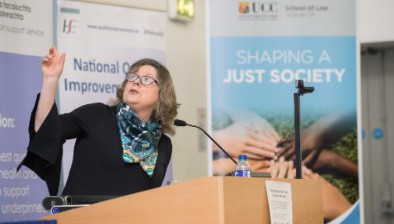Court of Appeal: High Court’s refusal of wardship adjournment set aside
The Court of Appeal has overturned the ruling of then-president of the High Court, Mr Justice Peter Kelly, refusing to adjourn an inquiry into whether a man with a moderate learning disability who wanted to marry should be made a ward of court.

About this case:
- Citation:[2020] IECA 225
- Judgment:
- Court:Court of Appeal
- Judge:Ms Justice Máire Whelan
Background
A, a man with Down Syndrome and a moderate learning disability, is in the care of S, a HSE-funded charity which delivers social services in respect of education, health and wellbeing of persons with an intellectual disability. Both of A’s parents are dead, and A went to reside in a facility operated by S shortly before the death of his mother in 2015.
A has been in a long-term relationship with F, a woman who also has a diagnosis of Down Syndrome and a learning disability. S also provides her with service under a self-directed independent living arrangement. They made arrangements to marry, which were opposed by A’s family, who believe that he lacks the capacity to enter into and sustain a marital relationship. There is a dispute between medical experts on the issue.
On 20 June 2019, “the very eve of the proposed marriage”, S applied ex parte to the High Court in wardship and obtained an injunction restraining A from participating in a ceremony of marriage until further order of the court. Proceedings were initiated seeking that he be brought into wardship as a person of unsound mind and incapable of managing his person and property, the test for wardship under the Lunacy Regulation (Ireland) Act 1871. The wardship process was supported by the A’s siblings.
A opposed being taken into wardship as the Marriage of Lunatics Act 1811 provides that the marriage of a ward shall be void. A person who has been taken into wardship, as an individual whose person and estate have been committed to the care and custody of trustees or a committee pursuant to any Statute, is incapable of marrying until declared sane by virtue of the 1811 Act. The operation of the 1811 Act upon a ward of court is absolute and automatic.
The Courts (Supplemental Provisions) Act 1961 is the statutory basis for the jurisdiction vested in the High Court in relation to matters of wardship. The Supreme Court in In re F.D. [2015] IESC 83, [2015] 1 IR 741 clarified that such jurisdiction is wholly dependent upon statute.
In December 2019 plenary proceedings were instituted by A against the Minister for Health, the Minister for Justice and Equality, Ireland and the Attorney General which contend that the Marriage of Lunatics Act 1811, the Lunacy Regulation (Ireland) Act 1871 and the wardship jurisdiction vested in the President of the High Court, are repugnant to the Constitution. An order is also sought to compel the commencement of the Assisted Decision-Making (Capacity) Act 2015.
On 27 January 2020, within the plenary proceedings, a motion issued seeking a protective costs order (PCO) pursuant to Ord 99 of the Rules of the Superior Courts relieving A of any liability to pay costs to any party to the proceedings irrespective of the outcome. The motion was returnable before the High Court for hearing on 17 February 2020.
A, supported by F, applied to the President on 28 January 2020 to adjourn the wardship inquiry pending determination of the PCO motion in the plenary proceedings. The President refused to adjourn the wardship inquiry, directing that it proceed to hearing on 12 March 2020.
A appealed to the Court of Appeal.
Court of Appeal
Counsel contended that the practical consequence A being taken into wardship will be a permanent deprivation of his right to make his own decisions including whether to litigate. It was argued that by reason of the absolute nature of the provisions of the Marriage of Lunatics Act 1811, A could be permanently precluded from entering into a marriage notwithstanding that there is a difference of medical opinion in respect of whether he has capacity to marry.
Counsel argued that the President failed to have regard to the fact that A consented to the continuation of all existing interim orders, including an order prohibiting A from participating in any civil ceremony of marriage, pending determination of the PCO application. This consent, it was said, obviated any risk of prejudice arising from the adjournment.
Reliance was placed by counsel for S, the charity, on the decision of Mr Justice Nicholas Kearns in Lawlor v Geraghty [2011] 4 IR 486, the Supreme Court decision in R.B. v A.S. (Nullity: domicile) [2002] 2 IR 428, and the European Court of Human Rights decision in R.P. and Ors. v The United Kingdom [2013] 1 F.L.R. 744, where the court said: “In cases involving those with disabilities the court has permitted the domestic courts a certain margin of appreciation to enable them to make the relevant procedural arrangements to secure the good administration of justice and to protect the health of the person concerned.”
F supported A’s appeal, arguing that in refusing the adjournment there was an attendant risk of a denial of justice to her as she had a subsisting application before the President in the wardship proceedings seeking to set aside the injunction granted ex parte restraining her marriage to A.
The Court said that the matter had to be considered light of the jurisprudence and with due regard to the principles identified in Okunade v Minister for Justice [2012] 3 IR 152. Ms Justice Máire Whelan said that it was important to asses whether the applicant has established an arguable case, “if not, the application must be refused. The plenary proceedings are certainly arguable.”
She referred to Mr Justice Kenny’s judgment in Ryan v Attorney General [1965] IR 294 where the court said the right to marry was a personal right under Article 40.3
In her judgment, with which Ms Justice Mary Faherty and Mr Justice Maurice Collins agreed, Ms Justice Whelan said that President Kelly’s weighing of the factors was “clearly erroneous.”
The court held that the President “misdirected himself with regard to several crucial factual matters which cumulatively persuaded him to refuse the application. He further attached insignificant weight to the gravity of the practical consequences for A in circumstances where the unanimous medical evidence is that A’s capacity is such that he ought to be admitted to wardship. He failed to have due regard to the fact that wardship would automatically and permanently deprive A of his right to make his own decisions and in particular the right to litigate the irrevocable nature of the Marriage of Lunatics Act 1811 and whether he has legal capacity to consent to a marriage.”
Mr Justice Collins, in a concurring judgment, said that English jurisprudence suggests that the test for capacity to marry is “issue specific”, as per Sheffield City Council v E [2004] EWHC 2808 (Fam). In that case, Mr Justice James Munby held that capacity to understand the nature of the marriage contract “is not the same as capacity to look after oneself or one’s property. Often, of course, someone who lacks the capacity to do the one will also lack the capacity to do the other. But not necessarily.”
Mr Justice Colins said that the societal attitudes to mental capacity “have changed significantly since the enactment of the Marriage of Lunatics Act in 1811, eight years before the birth of Queen Victoria. If that proposition requires proof – and if the very title of the 1811 Act is not considered proof enough – it is demonstrated by the fact that in 2015 the Oireachtas enacted the Assisted Decision-Making Capacity Act 2015, section 7(1) of which repeals the 1811 Act.”
The judge noted that “Regrettably, none of these provisions of the 2015 Act have yet been commenced.”
Mr Justice Collins said that the right to marry is a fundamental constitutional right as per Zappone v Revenue Commissioners [2008] 2 IR 417. “The subsequent adoption by the people of the Thirty-Fourth Amendment to the Constitution, extending the right to marry to same-sex couples, demonstrates in a very concrete way the important value attached to that right in this jurisdiction.”
He noted A’s right of access to the courts is a fundamental right, citing Brandley v Deane [2018] 2 IR 741. In that case, Mr Justice Liam McKechnie noted that access to justice was a personal right guaranteed by Article 40.3.1° of the Constitution (Murphy v Minister for Justice [2001] 1 IR 95): accordingly, such is a fundamental right of every person, citizen or not, in Ireland ( Murphy v Greene [1990] 2 IR 566.
He said that Mr Justice Kelly’s order gave rise to a serious risk of injustice to A. “In those circumstances, the Court was clearly entitled – and obliged – to intervene.”
Conclusion
The order refusing the adjournment was set aside, and a stay was granted pending determination of the motion now seeking PCO, with the stay to operate only until the determination of that motion. All other applications are to be remitted to the President of the High Court in wardship.











